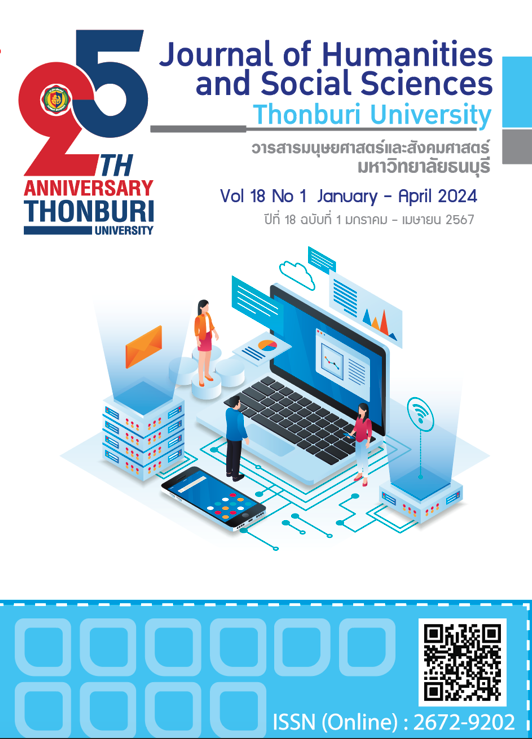องค์ประกอบภาวะผู้นำเชิงนวัตกรรมของผู้บริหารเพื่อความเป็นเลิศของสถานศึกษาอาชีวศึกษาเอกชน สังกัดสำนักงานคณะกรรมการการอาชีวศึกษา
คำสำคัญ:
องค์ประกอบ, ภาวะผู้นำเชิงนวัตกรรม, ผู้บริหารสถานศึกษา, สังกัดสำนักงานคณะกรรมการการอาชีวศึกษาบทคัดย่อ
การวิจัยนี้มีวัตถุประสงค์เพื่อ 1) ศึกษาองค์ประกอบภาวะผู้นำเชิงนวัตกรรมของผู้บริหาร สังกัดสำนักงานคณะกรรมการการอาชีวศึกษา 2) วิเคราะห์องค์ประกอบภาวะผู้นำเชิงนวัตกรรมของผู้บริหาร สังกัดสำนักงานคณะกรรมการการอาชีวศึกษา โดยการสอบถามผู้บริหารสถานศึกษาอาชีวศึกษาจำนวน 205 คน เครื่องมือที่ใช้ในการวิจัย ได้แก่ แบบสอบถาม มีค่าความเชื่อมั่น .95 สถิติที่ใช้ในการวิเคราะห์ข้อมูล ได้แก่ ได้แก่ ค่าเฉลี่ย ค่าส่วนเบี่ยงเบนมาตรฐาน การวิเคราะห์เนื้อหา และการวิเคราะห์องค์ประกอบเชิงยืนยัน (Confirmatory Factor Analysis) ผลการวิจัยพบว่า 1. ผลการศึกษาองค์ประกอบภาวะผู้นำเชิงนวัตกรรม มี 7 องค์ประกอบ ได้แก่ 1) ด้านวิสัยทัศน์เพื่อการเปลี่ยนแปลง 2) ด้านการทำงานเป็นทีม 3) ด้านความคิดสร้างสรรค์ 4) ด้านการมีส่วนร่วม 5) ด้านการสร้างบรรยากาศสังคมแห่งการเรียนรู้ 6) ด้านการบริหารความเสี่ยง และ 7) ด้านบรรยากาศแห่งองค์การนวัตกรรม และ 2. ผลการตรวจสอบความสอดคล้องกลมกลืนของโมเดลการวิเคราะห์องค์ประกอบเชิงยืนยันภาวะผู้นำเชิงนวัตกรรมของผู้บริหาร สังกัดสำนักงานคณะกรรมการการอาชีวศึกษา สอดคล้องกับข้อมูลเชิงประจักษ์ โดยมีค่าไค-สแควร์ ( x2 เท่ากับ 11.258 ที่องศิสระ df เท่ากับ 13 มีค่า p เท่ากับ .589) ซึ่งแตกต่างจากศูนย์อย่างไม่มีนับสำคัญ ค่าดัชนีความกลมกลืน (CFI) มีค่าเท่ากับ 1.000 ค่าดัชนีวัดความกลมกลืนที่ปรับแก้แล้ว (GFI) มีค่าเท่ากับ .984 และค่าดัชนีรากของค่าเฉลี่ยกำลังสองของส่วนเหลือ (RMR) มีเท่ากับ .004
เอกสารอ้างอิง
กระทรวงศึกษาธิการ. (2559). แผนพัฒนาการศึกษาของกระทรวงศึกษาธิการ ฉบับที่ 12 (พ.ศ. 2560 - 2564). กรุงเทพฯ: สำนักงานปลัดกระทรวงศึกษาธิการ.
จอมพงศ์ มงคลวนิช. (2556). การบริหารองค์การและบุคลากรทางการศึกษา. พิมพ์ครั้งที่ 2. กรุงเทพฯ: วี.พรินท์.
ณฐาพัชร์ วรพงศ์พัชร์. (2563, กรกฎาคม-ธันวาคม). ที่ศึกษาองค์ประกอบภาวะผู้นำเชิงนวัตกรรมสำหรับผู้บริหารสถาบันการอาชีวศึกษาเขตภาคตะวันออกเฉียงเหนือของประเทศไทย. วารสารบริหารศาสตร์ มหาวิทยาลัยอุบลราชธานี, 9(2).
พยัต วุฒิรงค์. (2555). การจัดการนวัตกรรมจากแนวคิดสู่การปฏิบัติที่เป็นเลิศ. กรุงเทพฯ: สำนักพิมพ์แห่งจุฬาลงกรณ์มหาวิทยาลัย
พระราชบัญญัติพื้นที่นวัตกรรมการศึกษา พ.ศ. 2562. (2562). ราชกิจจานุเบกษา เล่ม 136 ตอนที่ 56 ก. หน้า 102-120 (30 เมษายน 2562).
หรรษธร บุญเกื้อ. (2563). ความต้องการจำเป็นในการบริหารโรงเรียนประถมศึกษาเอกชนตามแนวคิดภาวะผู้นำเชิงนวัตกรรมของนักเรียน. วิทยานิพนธ์ครุศาสตรดุษฎีบัณฑิต สาขาวิชาบริหารการศึกษา คณะครุศาสตร์ จุฬาลงกรณ์มหาวิทยาลัย.
Lee, Allan. (2019). Leadership creativity and innovation: a meta-analytic. European Journal of Work and Organizational Psychology, 29(1): 1-35.
Pagaura, A. (2020). Innovative leadership attributes of school administrators in the Philippines: Implications for educational management. Philippines: Bukidnon State University.
Raechel French and Wesley Imms. (2020). Case studies on the transition from traditional classrooms to innovative learning environments: Emerging strategies for success. Improving Schools: SAGE Journals, 23(2), 175–189.
Translated Thai References
Boonkuer, H. (2020). Necessary needs in the management of private elementary schools according to the concept. Student Innovative Leadership. Doctor of Education Thesis Management Education Faculty of Education, Chulalongkorn University. (in Thai)
Educational Innovation Area Act B.E. (2019). Royal Gazette, volume 136, chapter 56 Kor. Pages 102-120 (30 April 2019). (in Thai)
Ministry of Education. (2016). Education Development Plan of the Ministry of Education, No. 12 (2017 - 2021). Bangkok: Office of the Permanent Secretary, Ministry of Education. (in Thai)
Mongkhonvanich, C. (2013). Organizational administration and educational personnel. 2nded. Bangkok: V. Print. (in Thai)
Worapongpat, N. (2020, July-December). Factors of Innovative Leadership for Vocational Education Administrators in Northeastern Region of Thailand. Journal of Management Science, Ubon Ratchathani University, 9(2). (in Thai)
Wutthirong, P. (2012). Innovation management from concept to best practice. Bangkok: Chulalongkorn University Press. (in Thai)
ดาวน์โหลด
เผยแพร่แล้ว
รูปแบบการอ้างอิง
ฉบับ
ประเภทบทความ
สัญญาอนุญาต
ลิขสิทธิ์ (c) 2023 Kongnat Yamchuti

อนุญาตภายใต้เงื่อนไข Creative Commons Attribution-NonCommercial-NoDerivatives 4.0 International License.
ผลงานที่ปรากฎในวารสารฉบับนี้เป็นลิขสิทธิ์เฉพาะส่วนบุคคลของผู้เขียนซึ่งต้องรับผิดชอบต่อผลทาง กฎหมายที่อาจเกิดขึ้นได้และไม่มีผลต่อกองบรรณาธิการ






